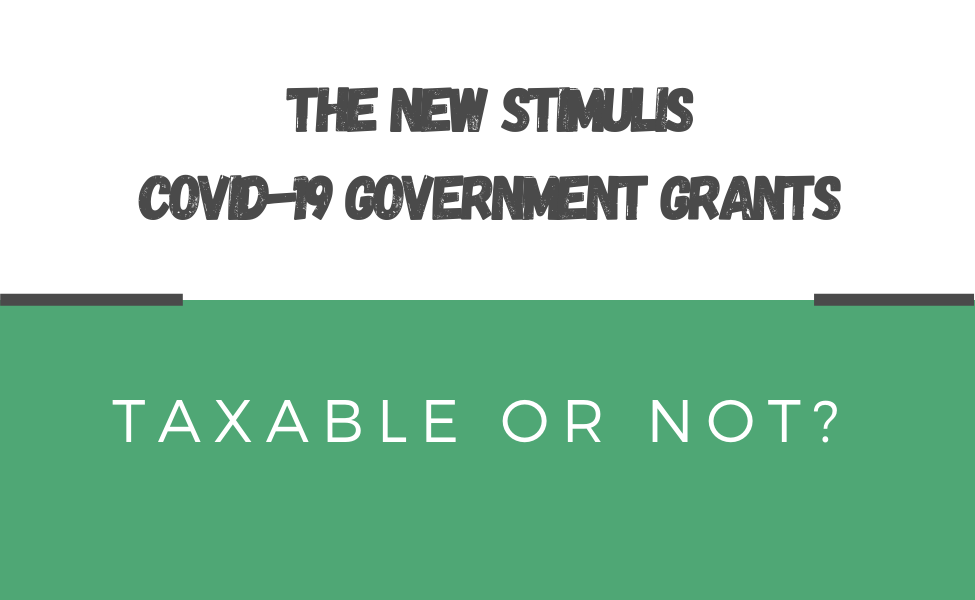The new Stimulis and what it means for COVID-19 related Government Grants
In an effort to stave off economic devastation caused by the COVID-19 pandemic, billions of dollars in grants are being handed out to individuals and businesses by the federal government and by state and local governments as well.
Are these grants taxable? Like most things in the world of taxes, it depends.
First , Let’s talk about what a Grant is?
Since there is no dumb tax questions, lets explore the answer. A grant is money you don’t have to pay back.
In contrast, you have to pay back a loan. For example, a Small Business Administration (SBA) Economic Injury Disaster Loan (EIDL) has to be paid back. This is a loan for a grant. Loans that have to be paid back, the plus is loans are not taxable income to the borrower.
In other words, it doesn’t reflect on your bottom line as money you earned because you have to pay it back.
Some COVID-related loans (Paycheck Protection Program (PPP) loans, for example) can be forgiven by the government. When this occurs, the loan effectively becomes a grant.
The General Rule is Grants Are Income
All income, from whatever source derived, is taxable income. Since a government grant is income, it is taxable unless otherwise provided by law. However like everything else there are always exceptions. Always read the fine print before signing on the dotted line!
COVID-19-Related Grants to Individuals
Fortunately, the general rule that grants are taxable does not apply to COVID-19-related grants to individuals. The general welfare exclusion allows individual taxpayers to exclude from their taxable income payments made by government units in connection with a qualified disaster. These include payments for necessary personal, family, or living expenses—or, more broadly, payments to promote the general welfare.
I hope it is obvious to everyone that The COVID-19 pandemic is a qualified disaster, so federal, state, and local government grants to individuals for COVID-19-related expenses are tax-free. This would include, rental assistance authorized by the recent enactment of the new stimulus bill that was signed into law by the president on December 27, 2020. Once again, always read the fine print, free money may not always be free.
COVID-Related Grants to Businesses
Payments to business do not qualify under the general welfare exclusion because they are for business and not individual or family needs. Thus, COVID-19-related government grants to businesses are taxable income unless Congress acts to specifically exempt them from tax. (Let’s keep our fingers crossed, but not hold our breaths!)
In the initial disaster relief act by congress, the CARES Act gave $150 billion to state and local governments to establish grant programs to help businesses impacted by the COVID-19 pandemic. The IRS has made clear that these state and local grants to businesses are taxable income.
State and local grants to businesses funded outside the CARES Act are also taxable income to the businesses. But Congress has acted to make a few types of COVID-19-related government grants tax-free, as described below.
EIDL Emergency Advances Are Tax-Free
When Congress enacted the CARES Act, it made low-interest EIDLs available to businesses in all 50 states. Congress also established a new EIDL emergency advance program that gave EIDL applicants loan advances of $1,000 per employee, up to $10,000. Although they’re called “advances,” these payments are actually grants—they need not be paid back.
Like I said always read the fine print!
Applicants received the EIDL advance whether or not they went ahead and completed the process to obtain an EIDL loan. Unfortunately, due to funding issues, not all eligible businesses were paid the full $10,000 advance to which they were entitled. The EIDL advance program ended July 11 when the funding ran out.
$20 Billion in New EIDL Advance Money Targeted to Businesses in Low-Income Areas
The new COVID-19 stimulus bill, provides $20 billion for EIDL advance grants of $10,000 for small businesses. There are the requirements for this new money
- The Business was in operation by January 31, 2020,
- Has fewer than 300 employees
- Were directly affected by COVID-19
- Are located in low-income communities
- There is how they determine this fine print: the census tracts with a 20 percent poverty rate or 80 percent of the statewide median income
- The business has suffered a decline in gross receipts greater than 30 percent during an eight-week period between March 2, 2020, and December 31, 2021, relative to a comparable eight-week period immediately preceding March 2, 2020, or during 2019 (as far back as January 1, 2019).
- This part is important for the businesses that didn’t get their full share of the EIDL money. The new law directs the SBA to allow those businesses described above that are existing EIDL advance grantees and received less than $10,000 to reapply for the difference between what they received and what they should have been paid.
No Offset of PPP for EIDL Advance—Refunds Coming
If you receive an EIDL advance and also a PPP loan, the CARES Act required the lender to deduct the advance from your PPP forgiveness, effectively denying you any benefit from the advance.
The new stimulus law repeals that requirement retroactively. (yay! I will be explaining this further in the next article. Sorry for the cliffhanger!.)
EIDL Advances Are Not Taxable; Expenses Paid Are Deductible
Most important, the new stimulus law provides that the EIDL advances are not taxable income. And otherwise deductible business expenses paid with EIDL advances are tax-deductible.
Grants for Shuttered Venue Operators Are Tax-Free
The new stimulus law also gives $15 billion to the SBA to make grants to live venue operators or promoters, theatrical producers, live performing arts organization operators, museum operators, motion picture theater operators, and talent representatives who demonstrate a 25 percent reduction in revenues due to the pandemic.
The SBA may make an initial grant of up to $10 million and a supplemental grant of up to 50 percent of the initial grant. The grants must be used for expenses such as payroll costs, rent, utilities, and personal protective equipment.
As with EIDL advances, these grants are tax-free, and expenses paid with the grants are tax-deductible.
This is an amazing boost for the arts and will help a struggling industry, not that everyone isn’t struggling (but when is the last time you went to go see a play?)
For this and more articles please look up more articles on our website.







